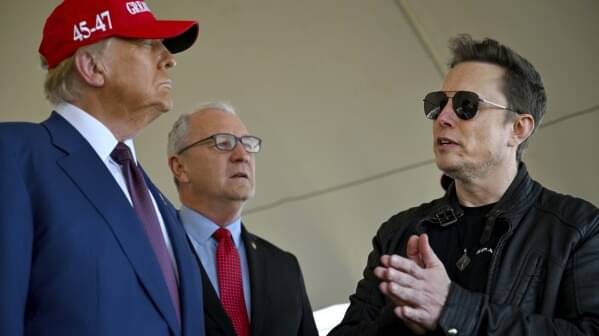Grok, Elon Musk’s AI, Sheds Light on the Drawbacks of Trump’s Immigration Policy

Trump’s Immigration Agenda: A Focus on Security
As Donald Trump begins his second term, immigration reform is once again a pressing topic. Since his inauguration on January 20, he has quickly issued over ten executive orders aimed at reinforcing and expanding the strict immigration policies initiated during his first term from 2017 to 2021. His unwavering support for stronger border security has reignited national discussions around immigration, attracting various viewpoints, including a noteworthy analysis from Grok, an artificial intelligence system created by Elon Musk’s xAI.
Strengthening Border Security
Trump’s immigration strategy heavily leans on reducing illegal entries and fortifying the U.S. border. Programs from his previous term, such as the “Remain in Mexico” initiative, have been reinstated, and new measures, like labeling Mexican cartels as terrorist organizations, have also been implemented. Additionally, 1,500 troops have been deployed to the U.S.-Mexico border to bolster security. Early reports suggest that these actions have produced significant outcomes: there has been a reported 94% decrease in illegal crossings in February 2025 compared to the previous year, marking a historical low. Supporters, particularly on social media platforms like X, applaud these tough measures, arguing that many migrants are now leaving the U.S. due to fears of deportation.
Data from Grok corroborates some of these claims, noting that apprehensions at the southern border were considerably lower during Trump’s first term, declining from 851,508 in fiscal year 2019 to 400,651 in fiscal year 2021, which indicates that his policies might effectively deter illegal immigration. Additionally, recent legislation called the Laken Riley Act mandates the detention of undocumented immigrants charged with certain offenses, aligning with Trump’s focus on public safety. Data from 2020 reveals that 85% of individuals deported had criminal records, a statistic underscored by Grok for those advocating for security-first policies.
Humanitarian Concerns and Economic Ramifications
Despite the favorable statistics for Trump’s policies, Grok emphasizes the adverse consequences as well. The analysis sheds light on the humanitarian crises that such policies can create. During Trump’s first term, the “Zero Tolerance” immigration policy led to the separation of over 5,500 children from their parents, according to estimates by the ACLU, inflicting long-lasting emotional trauma. Moreover, recent executive orders aimed at abolishing birthright citizenship and suspending asylum access have already prompted legal challenges from groups like the ACLU, claiming they violate constitutional and international laws.
Economically, the AI warns that Trump’s promise to deport between 15 to 20 million undocumented immigrants could severely impact vital sectors such as agriculture and construction, which rely on migrant labor. The American Immigration Council estimates that deporting just 11 million individuals could decrease the U.S. GDP by 4.2% to 6.8% over the next decade. States like California and Texas—heavily dependent on migrant workers—would particularly feel the negative effects of such mass deportations, creating potential economic instability.
Legal Hurdles and Practical Challenges
Grok also raises questions about the legal feasibility of some of Trump’s proposed changes, particularly the attempt to end birthright citizenship through executive order. This goal clashes with the 14th Amendment, which has been upheld by the Supreme Court since 1898. Furthermore, executing mass deportations faces financial constraints, with ICE’s 2024 budget of $9 billion falling short of the estimated $27 billion required for such operations. The presence of sanctuary cities and ongoing legal disputes could complicate the implementation of these policies further.
A Divided Public Opinion
Public sentiment surrounding Trump’s immigration policies remains deeply polarized. According to a recent Pew Research survey, nearly half of Americans (47%) find Trump’s push for deportations appropriate, while 44% believe it is excessive. Republicans generally support these initiatives, with 86% advocating for more deportations, in stark contrast to only 33% of Democrats who express approval. This division is mirrored on social media platforms, where opinions range from seeing Trump as a protector of American values to labeling his policies as humanitarian catastrophes.
Grok’s Neutral Analysis
What differentiates Grok from other analyses is its balanced approach. It states that Trump’s immigration policies can be deemed beneficial for those who value stringent border control and national security, yet they may be viewed as detrimental for those who prioritize humanitarian concerns, economic stability, or adherence to constitutional rights. Although data indicates a drop in illegal crossings, legal immigration has taken a significant hit, declining by 49% during Trump’s previous term, and deportations have not reached the anticipated levels.
For an AI developed by Elon Musk, who often aligns with Trump’s viewpoints, Grok’s candid stance on the disadvantages of these policies has raised eyebrows. Its objective analysis seeks to illuminate the complexities in a debate often colored by emotion, providing insights into the contentious immigration discourse. Whether this data-driven perspective influences public conversation remains uncertain, but Grok’s contributions are undeniably now attracting attention.






